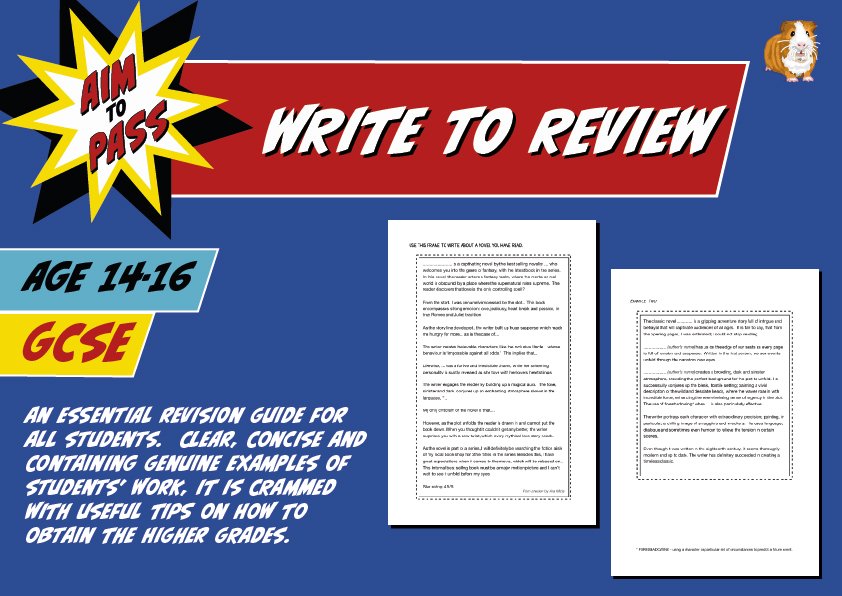 Image 1 of
Image 1 of


How Do I Improve My Grades In GCSE English writing? PART 2 (14-16 years)
A clear, concise revision guide to boost your grade, written by a tutor who is familiar with the requirements of the new GCSE examination. It is so simple you can use it for last minute revision. The skills and requirements for the GCSE English language exam are very specific: retrieving information from texts, inference, analysis of language, presentational techniques and comparing texts are some of the skills needed. For writing, students are required to engage the reader and produce a response, which relates to the purpose and audience. This book teaches students how to write using different purposes to inform, explain, argue, advise, describe, persuade, review and how to make the tone and register of their writing suitable for the audience. It emphasises the P.E.E or P.E.T.E.R technique, so students have a blue print (format) to work from; make POINT, give EVIDENCE, comment on TECHNIQUE, EFFECT and RESPONSE. This helps students to develop analytical skills for non-fiction tasks and responses in English literature papers. The students are also taught to use rhetorical techniques groups of three, speaking directly to the reader, rhetorical questions, inclusive pronouns as well as stylistic devices like similes, metaphors and high level vocabulary. The aim of this book is: To help every child gain a grade C in GCSE English. To outline the requirements of the present GCSE course and to teach students to structure and organise a piece of writing. To teach students to look for key words in a task and to plan a suitable response. To teach students to use linguistic and stylistic devices. To show them how to use rhetorical techniques. To teach P.E.E techniques and to teach the analytical skills required for English language and literature tasks. To teach good spelling, punctuation and grammar.
A clear, concise revision guide to boost your grade, written by a tutor who is familiar with the requirements of the new GCSE examination. It is so simple you can use it for last minute revision. The skills and requirements for the GCSE English language exam are very specific: retrieving information from texts, inference, analysis of language, presentational techniques and comparing texts are some of the skills needed. For writing, students are required to engage the reader and produce a response, which relates to the purpose and audience. This book teaches students how to write using different purposes to inform, explain, argue, advise, describe, persuade, review and how to make the tone and register of their writing suitable for the audience. It emphasises the P.E.E or P.E.T.E.R technique, so students have a blue print (format) to work from; make POINT, give EVIDENCE, comment on TECHNIQUE, EFFECT and RESPONSE. This helps students to develop analytical skills for non-fiction tasks and responses in English literature papers. The students are also taught to use rhetorical techniques groups of three, speaking directly to the reader, rhetorical questions, inclusive pronouns as well as stylistic devices like similes, metaphors and high level vocabulary. The aim of this book is: To help every child gain a grade C in GCSE English. To outline the requirements of the present GCSE course and to teach students to structure and organise a piece of writing. To teach students to look for key words in a task and to plan a suitable response. To teach students to use linguistic and stylistic devices. To show them how to use rhetorical techniques. To teach P.E.E techniques and to teach the analytical skills required for English language and literature tasks. To teach good spelling, punctuation and grammar.
A clear, concise revision guide to boost your grade, written by a tutor who is familiar with the requirements of the new GCSE examination. It is so simple you can use it for last minute revision. The skills and requirements for the GCSE English language exam are very specific: retrieving information from texts, inference, analysis of language, presentational techniques and comparing texts are some of the skills needed. For writing, students are required to engage the reader and produce a response, which relates to the purpose and audience. This book teaches students how to write using different purposes to inform, explain, argue, advise, describe, persuade, review and how to make the tone and register of their writing suitable for the audience. It emphasises the P.E.E or P.E.T.E.R technique, so students have a blue print (format) to work from; make POINT, give EVIDENCE, comment on TECHNIQUE, EFFECT and RESPONSE. This helps students to develop analytical skills for non-fiction tasks and responses in English literature papers. The students are also taught to use rhetorical techniques groups of three, speaking directly to the reader, rhetorical questions, inclusive pronouns as well as stylistic devices like similes, metaphors and high level vocabulary. The aim of this book is: To help every child gain a grade C in GCSE English. To outline the requirements of the present GCSE course and to teach students to structure and organise a piece of writing. To teach students to look for key words in a task and to plan a suitable response. To teach students to use linguistic and stylistic devices. To show them how to use rhetorical techniques. To teach P.E.E techniques and to teach the analytical skills required for English language and literature tasks. To teach good spelling, punctuation and grammar.





